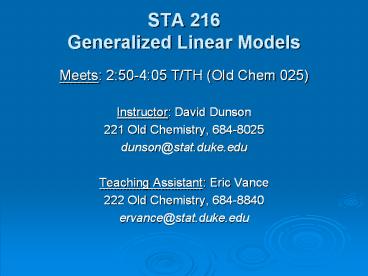STA 216 Generalized Linear Models - PowerPoint PPT Presentation
1 / 5
Title:
STA 216 Generalized Linear Models
Description:
... approximations, Gibbs sampling via adaptive rejection Latent variable models: Threshold formulations, probit models, discrete choice models ... each class (10% ... – PowerPoint PPT presentation
Number of Views:158
Avg rating:3.0/5.0
Title: STA 216 Generalized Linear Models
1
STA 216Generalized Linear Models
- Meets 250-405 T/TH (Old Chem 025)
- Instructor David Dunson
- 221 Old Chemistry, 684-8025
- dunson_at_stat.duke.edu
- Teaching Assistant Eric Vance
- 222 Old Chemistry, 684-8840
- ervance_at_stat.duke.edu
2
STA 216 Syllabus
- Topics to be covered
- GLM Basics components, exponential family, model
fitting, frequent inference analysis of
deviance, stepwise selection, goodness of fit - Bayesian Inference in GLMs (basics) priors,
posterior, comparison with frequentist approach,
posterior computation, MCMC strategies (Gibbs,
Metropolis-Hastings) - Binary categorical response data
- Basics link functions, form of posterior,
approximations, Gibbs sampling via adaptive
rejection - Latent variable models Threshold formulations,
probit models, discrete choice models, logistic
regression generalizations, data augmentation
algorithms (Albert Chib other forms) - Count Data Poisson over-dispersed Poisson
log-linear models, prior distributions,
applications
3
STA 216 Syllabus
- Topics to be covered (continued)
- Bayesian Variable Selection problem formulation,
mixture priors, stochastic search algorithms,
examples, approximations - Bayesian hypothesis testing in GLMs one- and
two-sided alternatives, basic decision theoretic
approaches, mixture priors, computation, order
restricted inference - Survival analysis censoring definitions, form of
likelihood, parametric models, discrete-time
continuous time formulations, proportional
hazards, priors for hazard functions, computation - Missing data problem formulation, selection
pattern mixture models, shared variable
approaches, examples - Multistate stochastic modeling motivating
examples (epidemiologic studies with periodic
observations of a disease process), discrete time
approaches, joint models, computation
4
STA 216 Syllabus
- Topics to be covered (continued)
- Correlated data (basics) mixed models for
longitudinal, frequentist alternatives (marginal
models, GEEs, etc) - Generalized linear mixed models (GLMM)
definition, examples, normal linear case -
induced correlation structure, priors,
computation, multi-level models, covariance
selection - Generalized additive models definition,
frequentist approaches for inference
computation (Hastie Tibshirani), Bayesian
approaches using basis functions, priors,
computation - Factor analytic models Underlying normal
formulations, mixed discrete continuous
outcomes, generalized factor models, joint models
for longitudinal and event time data, covariance
selection, model identifiability issues,
computation
5
- Student Responsibilities
- Assignments Outside reading and problems sets
will typically be assigned after each class (10) - Mid-term Examination An in-class closed-book
mid term examination will be given (30) - Project Students will be expected to write-up
and present results from a data analysis project
(30) - Final Examination The final examination will
have both in-class (15) out of class problems
(15)































